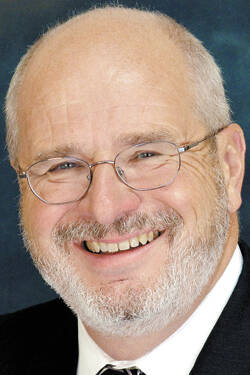Donald Trump has a spectacular gift for putting even the people who want to help him in difficult — if not impossible — positions.
David Pecker is perhaps the most visible current example.
Pecker, the former chief executive officer of the company that owns The National Enquirer, worked to help elect Trump president in 2016. He worked to squelch stories damaging to Trump’s candidacy and promote those that would hurt Trump’s opponents.
He thought of Trump as a friend.
Now, though, Pecker has testified against the former president, in the process revealing just how sleazy the Enquirer’s practices were and how broken Pecker’s own ethical compass is.
Pecker didn’t take the stand against his friend because he wanted to.
He did so because the cover-up Trump orchestrated of the former president’s alleged affair with porn star Stormy Daniels was so clumsy and obvious that Pecker had no other options. In attempting to protect Trump’s reputation, Pecker ran his own through a grinder.
Such often is the fate of Trump’s friends.
The former president is skilled at putting his allies in positions in which they cannot win.
While Pecker’s predicament has the highest profile, it is far from the biggest dilemma facing team Trump.
No, the most difficult choice is the one now before the U.S. Supreme Court, which must render judgment on Trump’s argument that, as a former president, he has almost absolute immunity from prosecution.
On its face, it’s an absurd argument. One of the principles our country has held the dearest is that no person is above the law.
If we Americans had not felt this way from the 18th century onward, we’d still have kings, not chief executives chosen by voting, bound by specific constitutional restraints and accountable to the people — all the people — they serve.
But with some of the other criminal charges Trump faces, this immunity defense may be the strongest one he has.
In the classified documents case, for example, the language of the law was clear, as is the documented trail of first requests and then demands that Trump return the materials to the national archives. Part of the reason the former president is fighting so furiously to delay the start of that trial is that he has nothing with which to refute the charges.
If the Supreme Court honors his immunity argument, that problem goes away.
There’s reason to believe several of the justices would like to help Trump if they could. Three of them — Neil Gorsuch, Brett Kavanaugh and Amy Coney Barrett — found their way onto the court because he nominated them. The wife of another — Virginia Thomas, spouse of Clarence Thomas — worked for Trump’s re-election and cheered on his attempts to overturn the results.
But here’s the issue.
If the court rules in Trump’s favor, it also gives President Joe Biden carte blanche to do just about anything he wants.
Trump’s attorneys argued that the president — any president — was so unconstrained by law that he could order the U.S. military to assassinate a political rival. The legal remedy for something that awful, the former president’s lawyers contended, was not arresting and trying the commander-in-chief on homicide charges but using the impeachment process.
Unless two-thirds of the U.S. Senate voted to convict in the impeachment process, the president — in Trump’s telling — literally could get away with murder.
As Trump’s defenders in the Senate demonstrated after the Jan. 6, 2021, insurrection, getting 67 votes in that once-distinguished body is close to impossible.
So, if the Supreme Court gives Trump his get-out-of-jail card, it also empowers Biden to do whatever he wants regarding this election.
He can use the Trump playbook and call election officials in swing states to tell them to count some votes and throw away others. Biden will be able to do whatever he wants, because he will have an immunity from prosecution established by Trump’s own arguments.
There really won’t be any point in having an election if that’s the case.
So, the members of the Supreme Court — especially those who are sympathetic to Trump — are in a damned-if-you-do, damned-if-you-don’t situation.
That’s Trump’s specialty, creating no-way-to-win scenarios for those closest to him.
He thinks he’s hard on his enemies.
But he’s even tougher on his friends.
John Krull is director of Franklin College’s Pulliam School of Journalism and publisher of TheStatehouseFile.com, a news website powered by Franklin College journalism students, where this commentary originally appeared. The opinions expressed by the author do not reflect the views of Franklin College. Send comments to [email protected].





